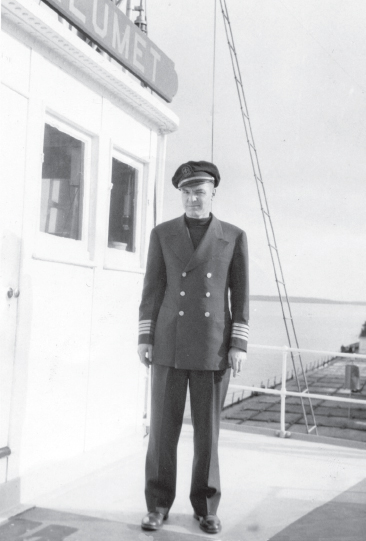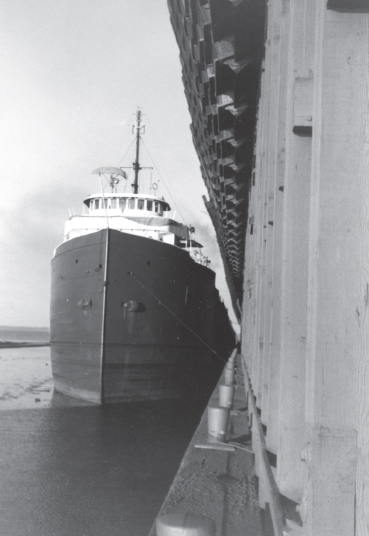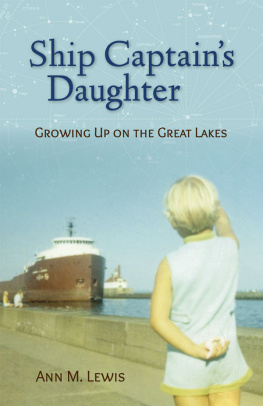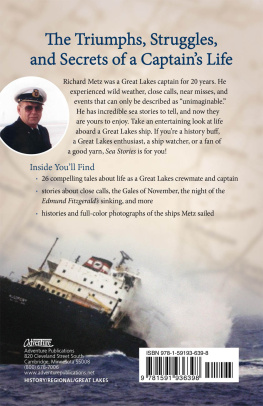
Ship Captains Daughter
Ship Captains Daughter

Growing Up on the Great Lakes
Ann M. Lewis
WISCONSIN HISTORICAL SOCIETY PRESS
Published by the Wisconsin Historical Society Press
Publishers since 1855
2015 by the State Historical Society of Wisconsin
E-book edition 2015
For permission to reuse material from Ship Captains Daughter (ISBN 978-0-87020-730-3; e-book ISBN 978-0-87020-731-0), please access www.copyright.com or contact the Copyright Clearance Center, Inc. (CCC), 222 Rosewood Drive, Danvers, MA 01923, 978-750-8400. CCC is a not-for-profit organization that provides licenses and registration for a variety of users.
www.wisconsinhistory.org
All photos are from the authors family collection unless otherwise noted. The cover photo shows the authors daughter, Amy Michler Lewis (married name Hunter), at age four, as she watches her grandfathers ship, the SS Herbert C. Jackson, enter the Duluth canal.
Cover design by Shawn Biner, Biner Design
Typesetting by Integrated Composition Systems, Spokane, Washington
19 18 17 16 15 1 2 3 4 5
E-book Cataloging in Publication Data
Lewis, Ann M.
Ship captains daughter : growing up on the Great Lakes / Ann M. Lewis. 1st edition. 1 online resource.
Description based on print version record and CIP data provided by publisher; resource not viewed.
ISBN 978-0-87020-731-0 (e-book) ISBN 978-0-87020-730-3 (print) 1. Lewis, Ann M.Childhood and youth. 2. Ship captainsMinnesotaDuluthBiography. 3. Ship captainsFamily relationshipsAnecdotes. 4. Seafaring lifeGreat Lakes (North America)Anecdotes. 5. GirlsMinnesotaDuluthBiography. 6. Great Lakes Region (North America)Biography. 7. Duluth (Minn.)Social life and customs20th century. 8. Duluth (Minn.)Biography. I. Title. II. Title: Growing up on the Great Lakes.
VK139
386.244092dc23
[B]
2015020135
To my parents Willis C. Michler and Dagmar A. Michler
my husband Herb
my children Amy and Lee
my son-in-law Jay and daughter-in-law Tiffany
my grandchildren Chloe, Sophie, and Herbie
and to all the people of the lake
Some went down to the sea in ships, doing business on the mighty waters.
PSALM 107

My father, Captain Willis C. Michler, stands next to the pilothouse of the SS Calumet, his second command. The four stripes on his sleeve designate his status as ships master.
The ship comes in, the ship goes out. As the daughter of a Great Lakes ship captain, I grew up to the rhythm of the transport of iron ore. From the arrival of the shipping orders in March to lay up in December, from climbing the ships ladder weekly to see my father while he was in port to watching his ship disappear again over the horizon line, my life was dominated by the excitement, the loneliness, the drama, and the lure of the shipping industry and the water.
My hometown of Duluth, Minnesota, is located at the western tip of Lake Superior. The water has always been the life of Duluth and its sister city, Superior, Wisconsin, where my father grew up. When iron ore was discovered in northern Minnesota and Wisconsin in the late 1800s, the Twin Ports, with their natural harbor, made it possible for giant cargo ships to carry ore from the mines in the north down through the Soo Locks to the steel mills on the lower lakes in the east. For generations, many local men have worked as shipbuilders, dockworkers, chandlers, uniform manufacturers, stevedores, and bridge tenders.
And then there are those men who have worked on the lake. My father, Willis Carl Michler, was one of them. He sailed the Great Lakes for forty-seven years and was a captain of thirteen different ships for twenty-one of those years. Drawn to the water and the big ships as a young man, he followed a dream of becoming a Great Lakes ship captain, and he and my mother and I lived it out together, in all its rich and varied and demanding dimensions.
My fathers sailing career spanned the height of Great Lakes iron ore shipping, the lows of the Great Depression, World War II(during which time the sailors served the country as members of the Merchant Marine), the opening of the St. Lawrence Seaway, the advent of radar, and the development of the taconite trade. He sailed before the invention of computers, GPS, cell phones, email, and Skypeand before sailors could apply for summer vacations. When I was growing up, we relied on letters Dad mailed from ports throughout the Great Lakes, calls from pay phones, and rare ship-to-shore calls. Today the ships that traverse the Great Lakes can be tracked on the internet. Many are twice the size of the freighters my dad first sailed, though at this writing, my fathers last command, the SS Herbert C. Jackson, is still sailing, albeit with modern renovations. Instead of raw iron ore, the ships now carry taconite pellets and varied other cargoes such as coal and grain. Yet for those who continue to work on the ships, some things remain unchangedthe urgency to deliver cargo quickly, the challenges of weather, time away from family, and the powerful call to a life on the water.

My dads ship rests at the dock in Ashland, Wisconsin, a seventy-mile drive from the Twin Ports of Duluth-Superior. The dock was built in 1915 to load ships with iron ore mined on the Gogebic Range of eastern Wisconsin and western Michigan.
My father was the first in his family to have a career on the water. Historically, his people were people of the land. Settling in the Fond du Lac area of southern Wisconsin from the agricultural heartland of Germany, they were courageous, industrious, disciplined, and religious. Some remained farmers, while others became blacksmiths. Two family members founded the Michler Company in Fond du Lac, crafting huge sleighs for use in Alaska and one for the Antarctic explorer Admiral Richard Byrd. One of them ran for mayor and helped found the family church. And one of them, my grandfather, left his people to become a conductor for the Soo Line Railroad Company in the northern Wisconsin port town of Superior, on the shores of the worlds largest freshwater lake.
At the age of sixteen, at the urging of his father and with the tools of his heritage plus his own romantic spirit, my father sailed out to sea. Ultimately, he became a Great Lakes ship captain.
From time to time, people have asked me what this life was likewhat my father was like, what my mothers life was like, and what it was like to be the ship captains daughter. The stories preserved in this book are my attempt to capture that lifestylethe cycles of waiting and bursts of excitement, the vital connection to the lake itselfexperienced by Great Lakes shipping families like my own.
We were people of the lake. When Lake Superior started to thaw, we started to wait. Most people in Duluth welcomed spring. For our family, it was the beginning of the end, not only of winter, but also of our land time together. When the days grew longer and the ice on Lake Superior began to break up, Dads shipping orders were soon to come. Every day they didnt was a relief. But sooner or later, inevitably, there they would be, jutting out of the mailbox in the long envelope marked The Interlake Steamship Company.
The house grew quiet, but the tempo of Dads preparations for departure picked up. So much to do before leaving for the new sailing season: fix that leaky faucet at Grandmas, pick up the new glasses, go to the bank, finish up at the dentist, drain the gas out of the snowblower, and get the lawn mower ready for Mom. Finally, Dad went up to the attic and dragged down the big canvas duffel bag with his name stenciled on it, and the little black bag containing the tools of his tradestar chart, quadrant, compass, slide rule. Then he started packing again.
Next page














